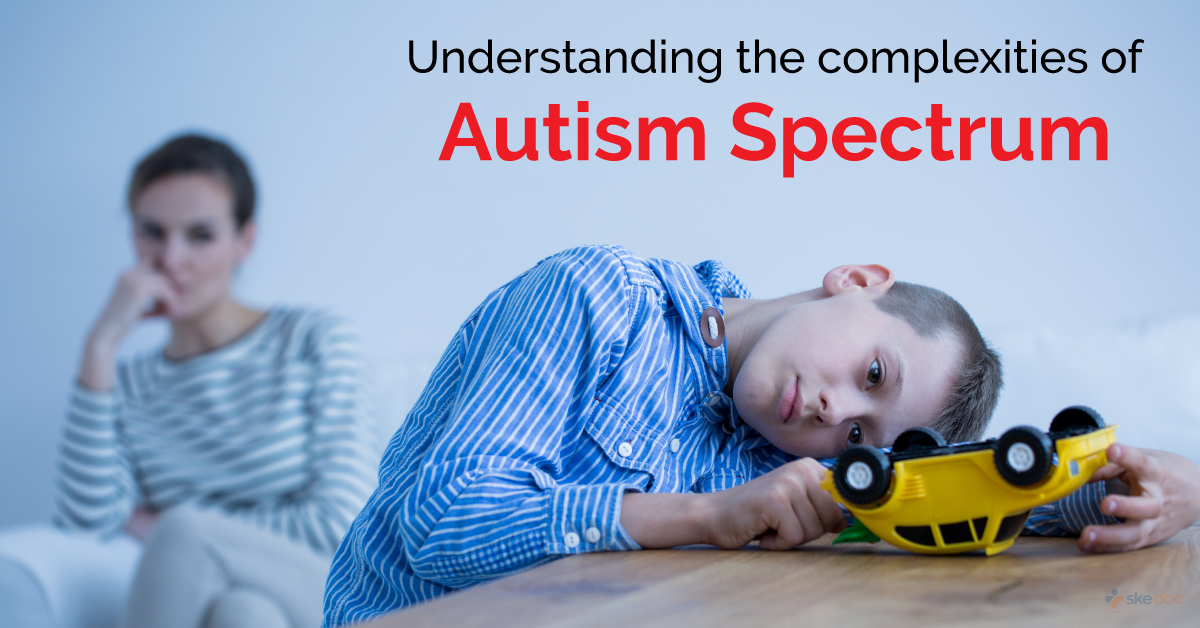Allergy
Blood Diseases
Bone & Joints
Brain
Cancer
Child Care
Cosmetic Surgery
Diabetes
Endocrinology
ENT
Eye
Gen Medicine
General Surgery
Heart
Kidney
Lifestyle
Liver & Digestive
Lung
Men’s Health
Mental health
Physiotherapy
Rheumatology
Skin and hair
Sleep Disorders
Spine
Transplant
Women Health
Thyroid
Vascular Surgery
Understanding the complexities of Autism Spectrum

What is Autism spectrum disorder?
Autism spectrum disorder (ASD) is a neurodevelopmental condition that presents various challenges in social interaction, communication, and behaviour. As a psychiatrist, it is crucial to delve into the intricacies of this disorder to provide accurate assessment, support, and intervention for individuals and families navigating the complexities of autism.
Causes
The exact causes of ASD remain complex and multifaceted, involving a combination of genetic and environmental factors. While a specific genetic cause is identified in some cases, many cases are believed to result from genetic susceptibility and environmental triggers. Prenatal factors such as maternal infections, exposure to toxins, and certain medications are among the factors being investigated. However, it's important to note that parenting practices or vaccines do not cause ASD, as some misconceptions suggest.
Symptoms
ASD is characterized by a wide spectrum of symptoms varying in severity and presentation. These symptoms are typically evident in early childhood and persist throughout a person's life. Some of the symptoms include
- Social Interaction: One of the hallmark features of ASD is difficulties in social interaction. Individuals with ASD may struggle with recognizing and interpreting nonverbal cues such as facial expressions, gestures, and tone of voice. They might have difficulty forming and maintaining relationships and might exhibit reduced interest in sharing emotions or experiences with others.
- Communication Challenges: Communication challenges are another key aspect of ASD. Some individuals may have delayed speech development or struggle with language acquisition altogether. Others might develop strong vocabularies but find it challenging to engage in back-and-forth conversations or understand figurative language and sarcasm. Some individuals with ASD might engage in echolalia, where they repeat words or phrases they've heard, which can serve as a way to communicate or self-regulate.
- Repetitive Behaviours: Repetitive behaviours and restricted interests are common among individuals with ASD. These behaviours can manifest as strict adherence to routines and rituals, intense focus on specific topics or objects, and repetitive movements such as hand-flapping or rocking. These behaviours often give individuals a sense of predictability and comfort in their environment.
Diagnosis
Early diagnosis and intervention are pivotal in optimizing outcomes for individuals with ASD. Diagnosis is typically based on observation of behaviours and developmental history. It's important to involve a multidisciplinary team, including psychiatrists, developmental paediatricians, psychologists, speech-language pathologists, and occupational therapists, in the assessment process to ensure a comprehensive understanding of the individual's needs.
Treatment and Management
- Therapies: Therapeutic interventions tailored to the individual's strengths and challenges play a significant role in managing ASD. Applied Behavior Analysis (ABA) is a widely recognized approach that focuses on shaping behaviour through positive reinforcement and systematic teaching. Speech therapy helps improve communication skills, while occupational therapy addresses sensory sensitivities and motor difficulties.
- Social Skills: Social skills training enhances individuals' abilities to navigate social interactions and develop meaningful relationships. This training might involve teaching individuals how to recognize emotions in others, understand social cues, and engage in reciprocal conversations. Cognitive-behavioural therapy can be beneficial in addressing anxiety and helping individuals manage the emotional challenges associated with ASD.
- Educational Strategies: Educational strategies should be individualized to accommodate the unique learning styles and needs of individuals with ASD. Some might thrive in mainstream classrooms with appropriate support, while others might benefit from specialized education settings that provide more tailored instruction and smaller class sizes.
As a psychiatrist, supporting families and caregivers is integral to managing ASD. Providing information about the disorder, offering coping strategies, and connecting families with support groups can alleviate stress and help families navigate the challenges of raising a child with ASD.
Conclusion
In conclusion, autism spectrum disorder is a neurodevelopmental condition characterized by social interaction, communication, and behaviour difficulties. Understanding the diverse range of symptoms and challenges individuals with ASD face is essential for accurate diagnosis and effective intervention. Early diagnosis, multidisciplinary assessment, and tailored therapeutic approaches are key to optimizing outcomes for individuals with ASD. Collaborative efforts involving psychiatrists, therapists, educators, and families play a vital role in providing comprehensive support and fostering the growth and development of individuals with ASD across their lifespan. Ongoing research continues to enhance our understanding of the disorder and inform innovative approaches to intervention and care.
Was this article helpful?
YesNo




